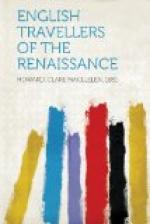“For private Gentlemen and Cadets, there be divers Academies in Paris, Colledge-like, where for 150 pistols a Yeare, which come to about L150 sterling per annum of our money, one may be very well accomodated, with lodging and diet for himself and man, and be taught to Ride, to Fence, to manage Armes, to Dance, Vault, and ply the Mathematiques."[248]
These academies were one of the chief attractions which France had for the gentry of England in the seventeenth century. The first one was founded by Pluvinel, the grand ecuyer of Henri IV. Pluvinel, returning from a long apprenticeship to Pignatelli in Naples, made his own riding-school the best in the world, so that the French no longer had to journey to Italian masters. He obtained from the king the basement of the great gallery of the Louvre, and there taught Louis XIII. and other young nobles of the Court—amongst them the Marquis du Chillon, afterwards Cardinal Richelieu—to ride the great horse.[249] Such was the success of his manege that he annexed masters to teach his pupils dancing, vaulting, and swordsmanship, as well as drawing and mathematics, till he had rounded out what was considered a complete education for a chevalier. In imitation of his establishment, many other riding-masters, such as Benjamin, Potrincourt, and Nesmond, set up others of the same sort, which drew pupils from other nations during all the seventeenth century.[250] In the suburb of Pre-aux-clercs, says Malingre in 1640, “are several academies where the nobility learn to ride. The most frequented is that of M. de Mesmon, where there is a prince of Denmark and one of the princes palatine of the Rhine, and a quantity of other foreign gentlemen."[251]
Englishmen found the academies very useful retreats where a boy could learn French accomplishments without incurring the dangers of foreign travel and make the acquaintance of young nobles of his own age. Mr Thomas Lorkin writing from Paris in 1610, outlines to the tutor of the Prince of Wales the routine of his pupil Mr Puckering[252] at such an establishment. The morning began with two hours on horseback, followed by two hours at the French tongue, and one hour in “learning to handle his weapon.” Dinner was at twelve o’clock, where the company continued together till two, “either passing the time in discourse or in some honest recreation perteyning to armes.” At two the bell rang for dancing, and at three another gong sent the pupil to his own room with his tutor, to study Latin and French for two hours. “After supper a brief survey of all."[253]
It will be seen that there was an exact balance between physical and mental exercise—four hours of each. All in all, academies seemed to be the solution of preparing for life those who were destined to shine at Court. The problem had been felt in England, as well as in France. In 1561, Sir Nicholas Bacon had devised “Articles for the bringing up in virtue and learning of the Queens Majesties




